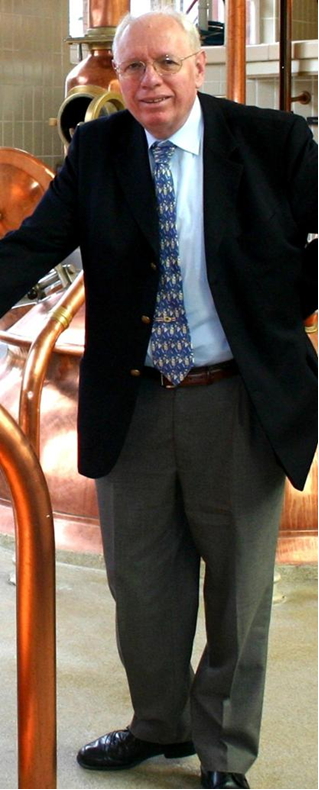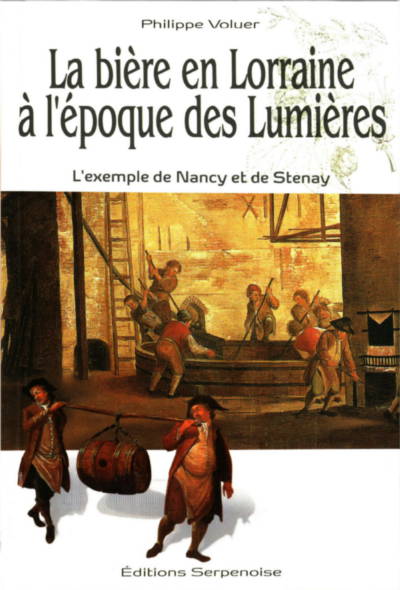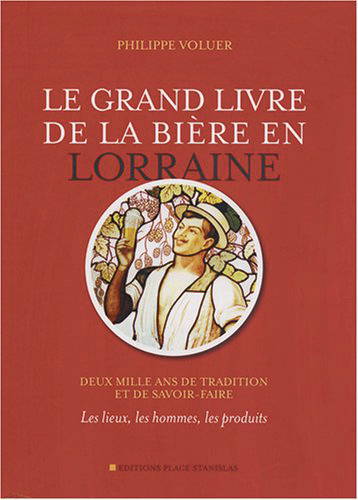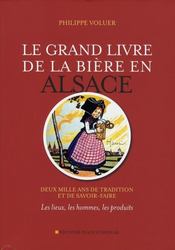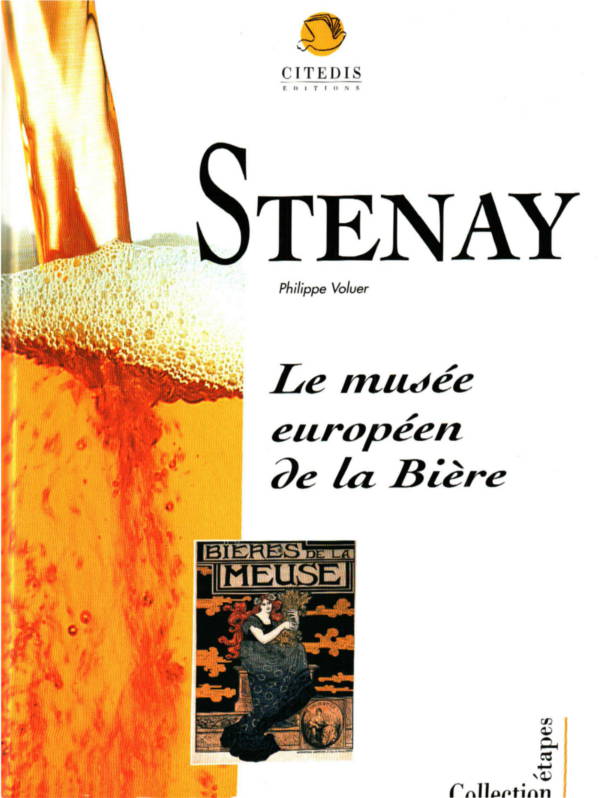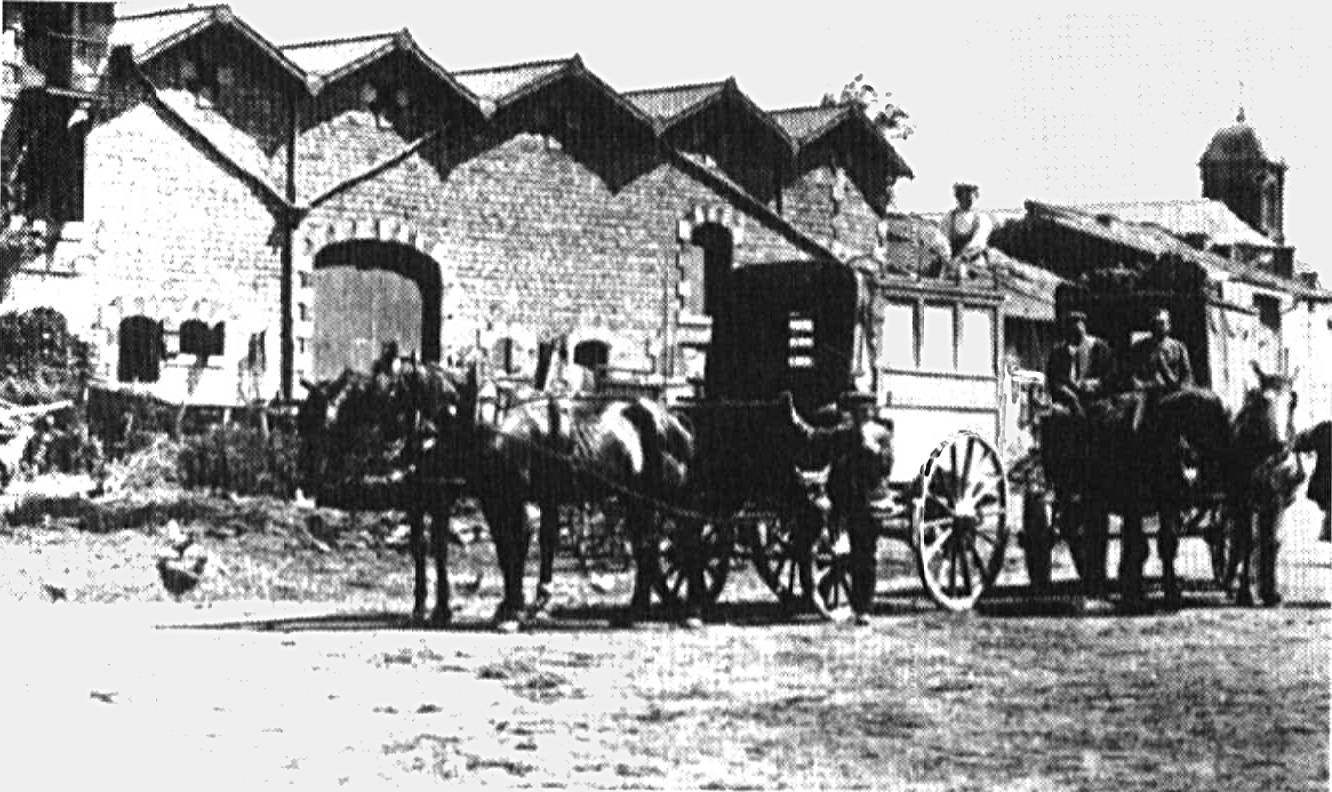This page pays tribute to Philippe Voluer, historian of the French brewery, founder of the Beer Museum of Stenay (Lorraine, France) and passionate about the history of this several thousand years old beverage.
Philippe Voluer died in October 2013 at the age of 63, after having devoted a large part of his life to in-depth historical research on the beer brewing in France. His many activities led him to create the Stenay Beer Museum. Through conferences, radio broadcasts and exhibitions, he has familiarised a wide public with the rich history of beer, its economic role and its social importance. Philippe Voluer has made a masterful contribution to restoring its credentials to a beverage that the honourable French winemaking tradition willingly leaves in the shadows.
The quality of his work as a historian, drawing on local and regional documentary sources, places his publications among the best European research in the field. They compare with the work of his German or British colleagues in terms of the wealth of information, the accuracy of the method, the control of the documentary sources, the historical analysis and the relevance of the iconography.
The patient and meticulous work of the historian-archivist is rarely crowned with fame. Philippe Voluer wrote neither historical novels nor docu-dramas about beer[1]. His work lays the foundations of a history of French brewing based on facts, documents and authenticated chronologies. Other beer historians will follow in his footsteps. All of them will have to acknowledge their debt to this scrupulous and enthusiastic historian.
Philippe Voluer didn't just write about beer. With a deep educational vocation, in 1986 he founded the Beer Museum of Stenay, one of the first French museums dedicated to brewing. He thus made available to the public collections of brewers' tools and machines, posters and iconography, documents and collections that he had largely helped to gather. For several years, he ran the museum, finding the energy to carry out his work as a beer researcher and historian in parallel.
His tireless action has saved brewing equipment, tools and documents from destruction during breweries closures. His initiatives and friendships with many brewers have made such rescues possible, at a time when there was little concern about preserving our industrial heritage.
PHILIPPE VOLUER, HISTORIAN of the BREWERY
To understand the contribution of this historian, it is necessary to reread the works on beer published in France in the 80-90s. France, the country of historians, has no shortage of remarkable publications. But when it comes to beer, most of the works are simply compiling old books, copying legendary facts, or rehashing popular imagery, its stereotypes and prejudices about the sparkling and foaming drink. Beer does not come out of folklore and pseudo-history. Serious and scholarly studies are dedicated to wine, tea or other drinks considered more prestigious than beer.
Historians, for their part, usually limit themselves to publishing monographs on breweries and their brewer dynasties, whose heirs most often commissioning their work. Between 1996 and 2012, Philippe Voluer himself is publishing three booklets devoted to the history of a brewery[2]. These valuable monographs generally provide useful and rich material. But they do not depict a regional or national background of the beer history. The historian would like to place all these family and industrial adventures in the broader context of regional societies or national social histories.
This is, in a few words, the situation of beer studies in France in the 1980s. Philippe Voluer, the historian by profession, will take this question head on and devote 30 years of his life to it.
(1) Set a precise geographical and chronological framework. Philippe Voluer voluntarily restricts his studies to Lorraine, Meuse, Alsace, Champagne and the Ardennes. He studies primarily the 19th and 20th centuries, the golden age of industrial brewing. His introductions to beer from the Middle Ages to the 18th century borrow from literature. His latest studies, notably La Bière en Lorraine à l'époque des Lumières. L'exemple de Nancy et Stenay (Beer in Lorraine during the Age of Enlightenment. The example of Nancy and Stenay) (2005), make a brilliant foray into 18th century France. The historian will only allow himself this freedom after having gathered a large amount of documentation on this period.
(2) Collect and check the documentary sources. An archivist and historian by training, Ph. Voluer had no difficulty in moving around in the world of departmental or communal document collections, or even the private archives of industrial breweries. However, the task was colossal. It involved a detailed exploration of two to three centuries of beer history for entire regions of north-eastern France. In order to push back the limits of his personal work, Ph. Voluer led networks of informers who collected a wide variety of historical documents and materials. This method had already been tested on a small scale with the Groupement Archéologique de Stenay. In this way, Ph. Voluer has been able to gather a considerable amount of documentation over more than 30 years. All that remained was to sort it out, put it in order and analyse it. A task no less immense.
(3) Cross-check and compare all available data. Philippe Voluer does not limit himself to retracing the highlights of the brewing world of past centuries. He brings together the great History, its political events, economic data, descriptions of lifestyles and documents from social and industrial life, dating from the 18th century to the present day. Needless to say, isolating the major historical movements of brewing over the long term, on the scale of one or more centuries, requires extraordinary intellectual qualities. Ph. Voluer has been able to identify the internal logic of the brewery's historical evolutions by taking into account what is due to technology, the economy and the social changes. This three-dimensional analysis restores beer in all its complexity and historical dynamics. This new insight, based on the most relevant archive documents and illustrations, is a major contribution by Philippe Voluer to the general history of French brewing over the last 3 centuries.
Ph. Voluer's first regional studies began in 1991 with bières de meuse et de lorraine (Meuse and Lorraine beers). This book, a classic for the time, exploits the advertising documents created by the industrial breweries (posters, labels, postcards, photographs). It is organised as a series of monographs on the great breweries of the region since the 19th century. The author is already trying to identify the main historical trends, through the divergent evolutions of the breweries or their common features.
La bière en Ardenne et en Champagne (1997) (Beer in the Ardennes and Champagne) confirms this approach. The rich iconography from the breweries is used to illustrate the themes that Ph. Voluer wants to study: From the glory to the total disappearance of the brewery in France (1890-1990), Brewers and maltsters or the masters of beer, Raw materials, Beer making, Small and Large breweries.
His most remarkable works, from the point of view of historical synthesis, are obviously :
This rigorous method, applied with such efficiency and talent by Philippe Voluer, does not prevent this beer historian from visiting other eras, the Middle Ages or antiquity for example, and other cultures. One of his studies on beer among the Gauls and Romans is to be published soon (Edition of the Brewery Museum, Saint-Nicolas-de-Port).
PHILIPPE VOLUER, FOUNDER of the STENAY BEER MUSEUM
On 26th April 1986, the Stenay Beer Museum opened its doors. Philippe, an active member of the local archaeological society for a long time, was made available to the town of Stenay (officially as municipal archivist) and seconded to the association that manages the Museum. Research and work, largely driven by Philippe, had begun 2 years earlier. On 24th July 1984, the town of Stenay has acquired the buildings of the former malt factory which were to serve as the setting for the museum. A two-year renovation project will be necessary to fit them out, to install the brewing equipment and the historical collections about beer, and to invent the pedagogical circuits of the first French beer museum.
The research on beer and the collection of materials and documents carried out by Ph. Voluer at French and Belgian breweries had begun several years earlier, particularly those which ceased their activity in the period 1974-1986. The collection of brewery objects and materials has never ceased since then. In particular, Ph. Voluer has built up a very important library and archive collection, one of the largest in France[3]. He has also organised a wide variety of events in the museum (exhibitions, conferences, colloquiums, exchange exchanges...) and has even obtained the edition of a postage stamp. The Museum, labelled European Beer Museum, is enjoying its best period (about 15,000 visitors per year), even if the limited financial means gave its manager a lot of worries. Ph. Voluer directed and invigorated the Stenay Museum until the early 2000s.
He was a great help in the creation of the Museum of Saint Nicolas de Port. He has taken part in numerous exhibitions and events organised in Saint Nicolas over the last 20 years.
PHILIPPE VOLUER, the PASSION for the HISTORY of BEER
Philippe has always lived in Stenay. His brewer ancestor, Isidore Kintzüger, worked before 1914 at the Claisse brewery in Chauvency-le-Château, Meuse, between Stenay and Montmédy.[4]. His mother ran a café and his father was a beer warehousekeeper in Stenay on behalf of the Grande Brasserie Ardennaise (GBA in Sedan). Philippe spent his entire youth in this family of Stenaisian beer warehousemen.
Trained as a historian, he became a teacher before devoting himself to the creation of the Musée du Pays de Stenay (1981), the Musée Européen de la Bière de Stenay (1984) and the Conservatoire de la Brasserie (1986).
Philippe has been involved in numerous associations dealing with beer and brewing. He has given numerous conferences and set up or contributed to the setting up of a wide variety of exhibitions. He created the "Lorraine Beer Route" association, which brought together various brewing sites in Lorraine and helped to promote them. Lorraine is home to the only three French brewery museums in Stenay, Ville-sur-Illon (Musée vosgien de la brasserie) and Saint Nicolas de Port, as well as the remains of prestigious breweries that have now disappeared (Tantonville, Maxéville, Bar le Duc, etc.). He was also technical adviser to the "European Beer Circuit" (France, Belgium and Luxembourg).
Philippe Voluer and Benoît Taveneaux (President of the French Brewery Museum in Saint-Nicolas-de-Port) have together created the FNABRA (Fédération Nationale des Associations BRAssicoles) with headquarters in Saint-Nicolas-de-Port (54210). Philippe was its president. About ten associations throughout France are members of this federation[6].
|
La disparition de Philippe Voluer a généré une vive émotion. Nous savons combien ses travaux et sa personnalité vont nous manquer. Christian Berger s’intéresse à la naissance de la bière au niveau mondial. « Beer-studies » témoigne de son travail d’historien. Benoit Taveneaux, Jean Paul Hébert, Dany Griffon
|
This bibliography only lists studies directly related to beer. Philippe Voluer also signed alone, with his wife or with the Groupement Archéologique de Stenay, publications concerning the history of Stenay, his native town, or that of his region[5], and a host of articles in the press and magazines. And many articles in particular in "La feuille de houblon", as well as regular radio chronicles (Belgian radio station).
- Vivre en Lorraine — La bière, CDRP Nancy 1986.
- Larousse de la bière 1988 (collaboration).
- La bière en Alsace 1989 (un chapitre).
- De céréales et d'eau. La brasserie française. Terrain n° 13 | 1989, 125-129.
- bières de meuse et de lorraine, Collection Meuse, Éditions de l’Est 1991.
- La Route de la Bière, Éditions Serpenoise 1991.
- Petite et Grande histoire de la bière de mars, Brasseurs de France 1993.
- Onse Be'er ass gudd! La Bière et les brasseries luxembourgeoises, coauteur au sein de la Confrérie Gambrinus. Les autres coauteurs sont Claude Lorang, Marc Obry, Raymond Weiller et Georges Zens. Éditions Schortgen 1993.
- La savoureuse histoire de la bière de mars, Brasseurs de France 1994.
- Sous le signe de l'Espérance., Brasserie Heineken, 1996. Monographie sur la brasserie de l'Espérance.
- Stenay — Le musée européen de la bière, CITEDIS 1997.
- La bière en Ardenne et en Champagne, Editions Terres Ardennaises 1997.
- Deux siècles d’affiches de la bière, CITEDIS 1998.
- La Bière en Lorraine à l'époque des Lumières. L'exemple de Nancy et de Stenay, Éditions Serpenoise 2005.
- Le grand livre de la bière en Alsace, Éditions Place Stanislas 2008.
- Le grand livre de la bière en Lorraine, Éditions Place Stanislas 2008.
- Une famille de brasseurs, les Lenfant, Autoédition 2012.
- La brasserie de l'Abbaye Notre-Dame de Saint Rémy à Rochefort, édité par la communauté religieuse. Monographie sur la brasserie de l'abbaye trappiste de Rochefort en Belgique.
- La brasserie La Licorne, édité par la brasserie.



